- Home
- Amanda Hocking
Between the Blade and the Heart
Between the Blade and the Heart Read online
Begin Reading
Table of Contents
About the Author
Copyright Page
Thank you for buying this
St. Martin’s Press ebook.
To receive special offers, bonus content,
and info on new releases and other great reads,
sign up for our newsletters.
Or visit us online at
us.macmillan.com/newslettersignup
For email updates on the author, click here.
The author and publisher have provided this e-book to you for your personal use only. You may not make this e-book publicly available in any way. Copyright infringement is against the law. If you believe the copy of this e-book you are reading infringes on the author’s copyright, please notify the publisher at: us.macmillanusa.com/piracy.
For Mike & Gavin—for all your love and support
ACKNOWLEDGMENTS
This will be the twenty-second book I’ve published, and while the process of writing books has gotten easier for me, writing acknowledgments is always hard. It’s not because I’m not grateful or because I don’t have people to thank—rather, it’s the opposite. I worry that I can’t properly express my gratitude, but I want to try, so here goes.
As always, first and foremost, I need to thank the readers. I am constantly moved and amazed by the responses I get from all of you—whether it be a message, a tweet, or an Instagram pic. I still can’t believe that so many of you choose to spend your time with my imaginary friends, and that you love them just as much as I do. (Some of you, I think, maybe love them even more than I do.)
I still see the occasional article about me, referencing my start in self-publishing years ago, and they usually mention how I did it all on my own. But I didn’t do any of this on my own. Without the amazing support from my friends, family, and readers like you propelling me forward, I would not be here writing these words today.
I want to thank my husband, Mike, and my stepson, Gavin, for understanding my long and sometimes frantic work hours, indulging all my odd obsessions, and lifting me up when I am down. Mike, in particular, does the hard work of reminding me that I’m capable of so much more than I think I am. I have a propensity to catastrophize and dramatize everything, but Mike and Gavin are both such literal people, they’ve made me so much more grounded and responsible. Without them both, I would be a much less happy and much less productive person, and they make even my worst days better.
My mom remains one of my strongest supporters, as does my aunt Cindy (who may be my biggest fan). My whole family in general is insanely wonderful and supportive, and I could write a whole book thanking them all. I want you to know that I love each and every one of you, and I’m so grateful for all of you.
My acknowledgments and my life would not be complete without thanking my best friend/cheerleader/former assistant, Eric. He may not work for me anymore, but he remains in my Top 5 Favorite People Ever. He’s still always there to listen, offer advice on my life and my books, and make me laugh when I need it.
Of course, I have to thank all my friends who still remain unbelievably wonderful and loving, despite the fact that adult life has gotten in the way of all of us seeing each other as much as we’d like. Thank you to Fifi, Valerie, Gregg, Pete, Matthew, Josh, Gels, Mark, Lucas, Amelia, and now Baby Isabelle, Sofia, and Oliver.
I also want to give a special thank-you to my longtime editor, Rose Hilliard. She’s worked with me the entire time I’ve been with St. Martin’s, and together we’ve worked on twelve books and five short stories. I am a better writer now than I was five years ago, and that’s in large part because of her encouragement and criticisms. She has now moved on to a different path, so this is the last book she worked on with me, but she has left an indelible mark on my life and my writing.
I want to thank the entire team at St. Martin’s/Wednesday Books, including my new editor, Eileen Rothschild. Everyone there does an amazing job making my books so much better than I could do on my own, and the team always creates ridiculously beautiful covers. I am grateful to have all of them championing my books.
And finally, I have to thank my dogs, Isley and Sawyer. They are by my side constantly, which means that on days when I spend long hours in my office, they’re in here, too. (As I write this, Isley is snoring softly as she sleeps by my feet, while Sawyer chews on a bone two feet away.) They might not work hard, but they make my days much happier, which definitely makes my job easier.
Valkyrie: noun /val- kir-ē/ from Old Norse valkyrja, literally “chooser of the slain,” referring to any of the maidens of Odin who choose the immortals to be slain and conduct them to the afterlife.
IN THE TIME BEFORE …
In the vast emptiness of space, the gods grew restless, and so they created the heavens above and the worlds below. They filled the earth with every creature imaginable, from the smallest fish in the sea to the largest dragon in the sky.
Their creations fell into two groups:
Immortals, which could be divine beings such as angels and fairies, or impious humanoids like demons and vampires, and even beasts like dragons or centaurs. They could roam the earth forever if nothing stood in their way, and rarely were mortals able to. But with the gift was one sharp restriction: They did as they were made. Evil begat evil, and good begat good, and they all acted accordingly.
Mortals, which were either humans who lacked the gifts of the gods, or animals like birds and rabbits. Their life spans were short, over in the blink of a god’s eye, but unlike the immortals, they had free will. They could act as good or evil as they chose.
While many of the immortals thought of themselves as gods and goddesses and often donned the title, the only real true gods were known as the Vanir gods—a council of supreme immortal beings that ruled over the cosmos. Unlike the immortals, the Vanir gods did not live on earth, and they had no power to create or destroy life at will.
The Vanir gods had agreed to watch from above and not interfere with the squabbles among the beings, but Odin could not be swayed by the pledge he’d made to the other Vanir gods. Despite his best intentions, he’d grown very fond of the humans.
Their joys, their determination, their unwavering belief in their own prestige—Odin relished it all. But he saw they were small and frail compared to the immortal creatures that stomped over them, trampling the humans despite their conviction of their own greatness. Angel and demon alike had taken over, claiming the world for their own, and soon the humans would be all but extinct.
To protect the fragile humans he’d grown so fond of, Odin created the Valkyries. They were mortal women he bestowed with supernatural powers and weapons, passed on from mother to daughter, and they were able to slay the immortals, keeping their powers in check.
The other gods cried out, saying that Odin was playing favorites if the humans could kill the immortals at will. So an intermediary was put in place—the Eralim, angelic beings who would take orders from the gods about what immortal should be slain and when. The Eralim would give the orders to the Valkyries, so that the humans never interacted directly with the gods.
A balance descended on the world, where the supernatural lived alongside the humans. For several millennia, this balance helped create an uneasy peace, one that the Valkyries would do anything to protect.
But one misstep, even the smallest lapse in duty, could send it all into a tailspin.…
That is not dead which can eternal lie.
And with strange aeons even death may die.
—H. P. LOVECRAFT
ONE
The air reeked of fermented fish and rotten fruit, thanks to the overflowing dumpster from the restaurant behind us. The
polluted alley felt narrow and claustrophobic, sandwiched between skyscrapers.
In the city, it was never quiet or peaceful, even at three in the morning. There were more than thirty million humans and supernatural beings coexisting, living on top of each other. It was the only life I’d ever really known, but the noise of the congestion grated on me tonight.
My eyes were locked on the flickering neon lights of the gambling parlor across the street. The u in Shibuya had gone out, so the sign flashed SHIB YA at me.
The sword sheathed at my side felt heavy, and my body felt restless and electric. I couldn’t keep from fidgeting and cracked my knuckles.
“He’ll be here soon,” my mother, Marlow, assured me. She leaned back against the brick wall beside me, casually eating large jackfruit seeds from a brown paper sack. Always bring a snack on a stakeout was one of her first lessons, but I was far too nervous and excited to eat.
The thick cowl of her frayed black sweater had been pulled up like a hood, covering her cropped blond hair from the icy mist that fell on us. Her tall leather boots only went to her calf, thanks to her long legs. Her style tended to be monochromatic—black on black on black—aside from the shock of dark red lipstick.
My mother was only a few years shy of her fiftieth birthday, with almost thirty years of experience working as a Valkyrie, and she was still as strong and vital as ever. On her hip, her sword Mördare glowed a dull red through its sheath.
The sword of the Valkyries was one that appeared as if it had been broken in half—its blade only a foot long before stopping at a sharp angle. Mördare’s blade was several thousand years old, forged in fires to look like red glass that would glow when the time was nigh.
My sword was called Sigrún, a present on my eighteenth birthday from Marlow. It was a bit shorter than Mördare, with a thicker blade, so it appeared stubby and fat. The handle was black utilitarian, a replacement that my mom had had custom-made from an army supply store, to match her own.
The ancient blade appeared almost black, but as it grew closer to its target, it would glow a vibrant purple. For the past hour that we’d been waiting on our stakeout, Sigrún had been glowing dully on my hip.
The mist grew heavier, soaking my long black hair. I kept the left side of my head shaved, parting my hair over to the right, and my scalp should’ve been freezing from the cold, but I didn’t feel it. I didn’t feel anything.
It had begun—the instinct of the Valkyrie, pushing aside my humanity to become a weapon. When the Valkyrie in me took over, I was little more than a scythe for the Grim Reaper of the gods.
“He’s coming,” Marlow said behind me, but I already knew.
The world fell into hyperfocus, and I could see every droplet of rain as it splashed toward the ground. Every sound echoed through me, from the bird flapping its wings a block away, to the club door as it groaned open.
Eleazar Bélanger stumbled out, his heavy feet clomping in the puddles. He was chubby and short, barely over four feet tall, and he would’ve appeared to be an average middle-aged man if it wasn’t for the two knobby horns that stuck out on either side of his forehead. Graying tufts of black hair stuck out from under a bright red cap, and as he walked ahead, he had a noticeable limp favoring his right leg.
He was a Trasgu, a troublemaking goblin, and his appearance belied the strength and cunning that lurked within him. He was over three hundred years old, and today would be the day he died.
I waited in the shadows of the alley for him to cross the street. A coughing fit caused him to double over, and he braced himself against the brick wall.
I approached him quietly—this all went easier when they didn’t have time to prepare. He took off his hat to use it to wipe the snot from his nose, and when he looked up at me, his green eyes flashed with understanding.
“It’s you,” Eleazar said in a weak, craggy voice. We’d never met, and I doubt he’d ever seen me before, but he recognized me, the way they all did when their time was up.
“Eleazar Bélanger, you have been chosen to die,” I said, reciting my script, the words automatic and cold on my lips. “It is my duty to return you to the darkness from whence you came.”
“No, wait!” He held up his pudgy hands at me. “I have money. I can pay you. We can work this out.”
“This is not my decision to make,” I said as I pulled the sword from my sheath.
His eyes widened as he realized I couldn’t be bargained with. For a moment I thought he might just accept his fate, but they rarely did. He bowed his head and ran at me like a goat. He was stronger than he looked and caused me to stumble back a step, but he didn’t have anywhere to go.
My mother stood blocking the mouth of the alley, in case I needed her. Eleazar tried to run toward the other end, but his leg slowed him, and I easily overtook him. Using the handle of my sword, I cracked him on the back of the skull, and he fell to the ground on his knees.
Sigrún glowed brightly, with light shining out from it and causing the air to glow purple around us. Eleazar mumbled a prayer to the Vanir gods. I held the sword with both hands, and I struck it across his neck, decapitating him.
And then, finally, the electricity that had filled my body, making my muscles quiver and my bones ache, left me, and I breathed in deeply. The corpse of an immortal goblin lay in a puddle at my feet, and I felt nothing but relief.
“It was a good return,” my mother said, and put her hand on my shoulder. “You did well, Malin.”
TWO
The crimson of the early morning sun glittered off the windows of the skyscrapers that towered above, making the glass look like fragmented rubies. In the heart of the city, dwarfed by all the buildings around it, sat the Evig Riksdag—the eternal parliament. Colloquially referred to as the Riks by Valkyries, it was where we all reported and got our orders from the Eralim.
The building’s design made it similar to a concrete mushroom, with the lower twenty floors narrow and almost windowless, while the top ten floors extended far past the base, held up by metal beams. It was a feat of engineering that the top-heavy building didn’t topple over. The austere appearance lent itself more to a government prison than to a place of celestial intervention.
A small computer screen was posted next to the front door, and I placed my hand on it. A beam of light flashed hotly over my hand, analyzing it, then the screen flashed green. The thick steel doors slowly slid open, and Marlow and I walked inside.
The lobby was deserted, save for the half dozen armed guards that were posted around the doors. Their black uniforms all had the same insignia on their shoulders—an eagle with the three horns of Odin. It was the symbol of the Vörðr, the powerful police force of the Evig Riksdag, mostly made up of sons of Valkyries.
The solid concrete walls enclosing the lobby gave the room a bunkerlike feel, but the black marble floors swirling with copper added a touch of elegance. Two bronze statues—men brandishing long swords, hunched under the shroud of their massive wings—were the only décor in the entire space.
But the Riksdag wasn’t the kind of place that encouraged loitering or visitors of any kind. Security was of the highest priority. There had been many attacks by immortals against the Riks, some that resulted in deaths of the Eralim and Valkyries that ran it, which was why the Vörðr needed to be the most elite police force in the world.
Many immortals took umbrage with the idea of being “returned,” which was the vernacular the Riks used for killing. We weren’t murderers—we were simply returning the immortals back to a world where they belonged.
Marlow and I took the elevator to the twenty-ninth floor, where we were greeted with a retinal scan before we could exit. A long corridor stretched out before us—more black marble floors and copper walls closing in on us. At the very end was a massive bronze door, and on either side stood Samael’s personal bodyguards.
Godfrey Wright was the larger of the two, but both were hulking. Godfrey stood well over seven feet tall, with bulging arms and a shaved
cranium. But what people usually noticed first was that he was a cyclops, with a solitary large eye above his nose.
The smaller and younger guard was Atlas Malosi. With light brown skin and cropped black hair, he had an open face and glittering dark eyes that made him appear much too friendly to be a guard.
He was the son of a Valkyrie, so he had the strength and height of one, but none of the supernatural ability that would make it possible for him to slay immortals. Only daughters could wield such power.
“How are you ladies doing this lovely morning?” Atlas asked, with a broad grin to match his broad shoulders.
“Just finished the job,” I replied.
“I assume that it all went well for you.” Atlas continued grinning.
“Is Samael in?” Marlow asked, cutting Atlas’s chatter.
The smile finally fell from Atlas’s face. “You know Samael. He’s always in.”
Godfrey was a man of few words, so he merely let out a grunt of agreement and gestured toward the door.
“Thank you.” I smiled politely at the guards, but Marlow was already opening the door and heading into Samael’s spacious office.
Samael had been assigned as my Eralim, because he’d been my mother’s before me. His office was sparsely furnished—a large desk in front of the glass wall that overlooked the city, a few art deco chairs and a sofa, and objets d’art he’d collected over the centuries displayed on the shelves that lined the walls.
Samael himself was sprawled out on the black velvet sofa, absently reading something on his electronic tablet, but he broke out in a smile when he spotted us. While Samael was well over three hundred years old, he didn’t look a day over twenty-five.
Lounging in black slacks and a dress shirt with the sleeves rolled up, he looked more like a college kid playing at grown-up than an experienced supervisor. Adding to that, he was incredibly handsome, with warm umber skin, bright aqua eyes beneath a strong brow, and a mass of shoulder-length chestnut curls with natural blond highlights coursing through.
-->

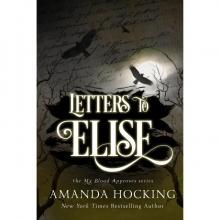 Letters to Elise: A Peter Townsend Novella
Letters to Elise: A Peter Townsend Novella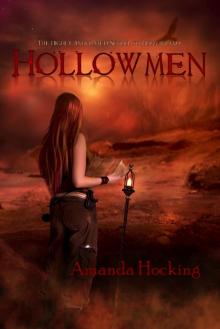 Hollowmen
Hollowmen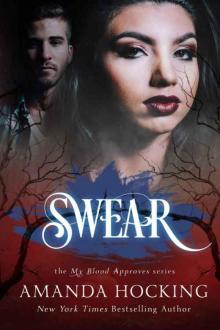 Swear
Swear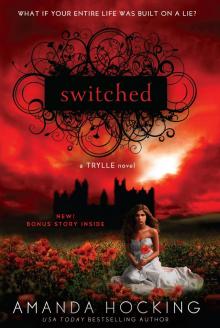 Switched
Switched My Blood Approves
My Blood Approves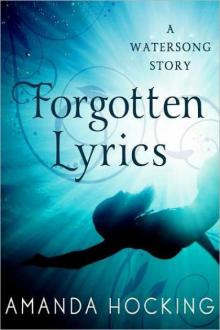 Forgotten Lyrics
Forgotten Lyrics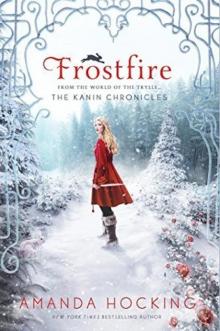 Frostfire
Frostfire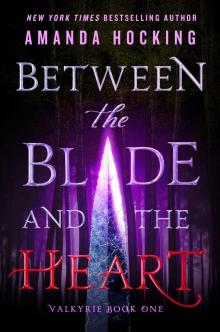 Between the Blade and the Heart
Between the Blade and the Heart Wake
Wake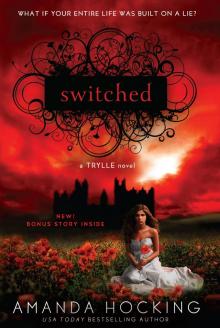 Torn
Torn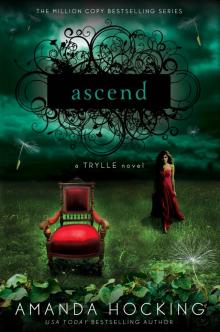 Ascend
Ascend Ice Kissed
Ice Kissed Hollowland
Hollowland Fate
Fate Elegy
Elegy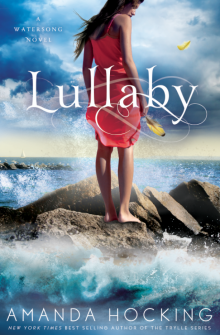 Lullaby
Lullaby Wisdom
Wisdom Tidal
Tidal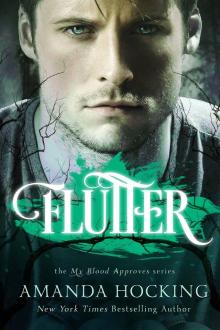 Flutter
Flutter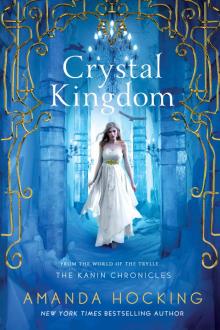 Crystal Kingdom
Crystal Kingdom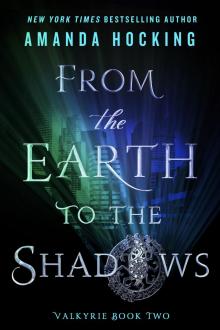 From the Earth to the Shadows
From the Earth to the Shadows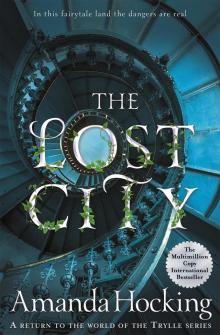 The Lost City
The Lost City The Morning Flower
The Morning Flower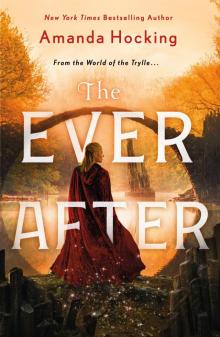 The Ever After
The Ever After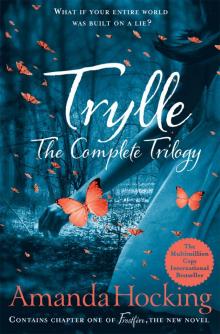 Trylle
Trylle Watersong03 - Tidal
Watersong03 - Tidal Wisdom (My Blood Approves series)
Wisdom (My Blood Approves series) Virtue - a Fairy Tale
Virtue - a Fairy Tale Elegy (Watersong #4)
Elegy (Watersong #4)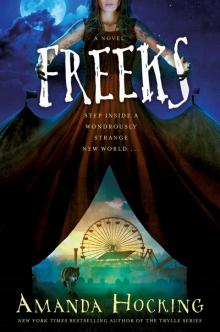 Freeks
Freeks Forgotten Lyrics: A Watersong Story (A Watersong Novel)
Forgotten Lyrics: A Watersong Story (A Watersong Novel)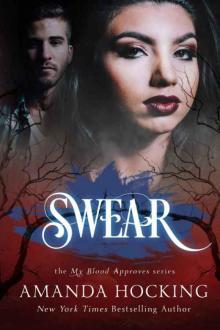 Swear (My Blood Approves #5)
Swear (My Blood Approves #5) Ice Kissed (The Kanin Chronicles)
Ice Kissed (The Kanin Chronicles)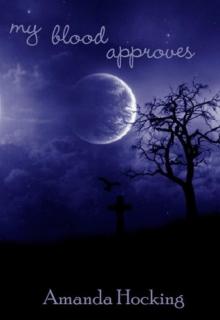 My Blood Approves mba-1
My Blood Approves mba-1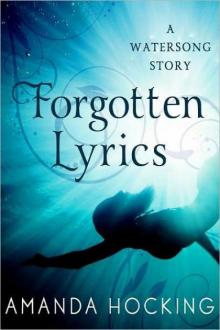 Forgotten Lyrics: A Watersong Story
Forgotten Lyrics: A Watersong Story Lullaby (A Watersong Novel)
Lullaby (A Watersong Novel) Wake (Watersong Novels)
Wake (Watersong Novels) Elegy w-4
Elegy w-4